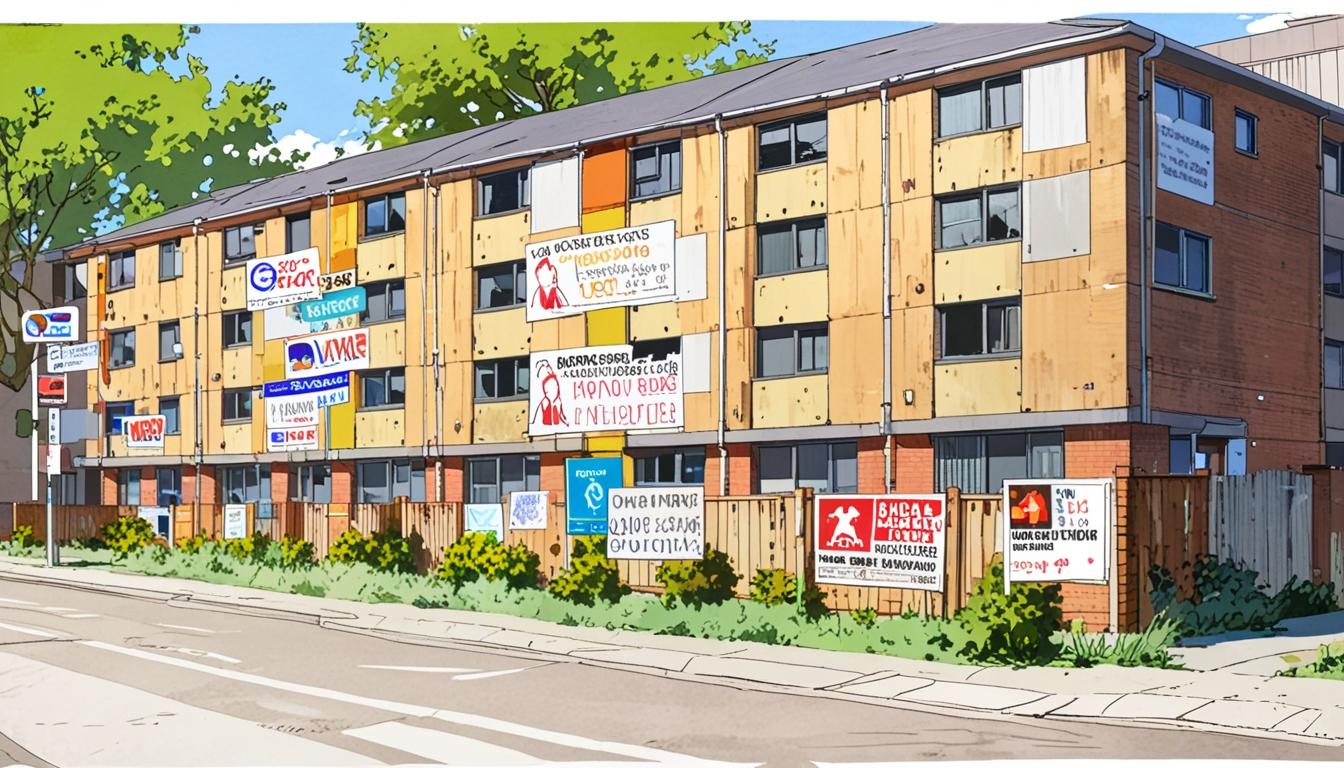Plans for a new residential block in Tile Hill, aimed at providing flats for homeless families, have been approved despite significant local opposition and concerns over community impact.
Plans for a new residential block aimed at housing homeless families in Coventry have been approved by council members, despite facing considerable local opposition. The project, which will provide flats for 50 families, is situated on Faseman Avenue in Tile Hill and received the green light during a council meeting held on 20 March.
The initiative comes in response to the soaring number of families requiring temporary accommodation in the city, which has risen to nearly 950 from 790 within the last year. The council highlighted the urgency of the project, stating its goal is to support the “most vulnerable” in the community and to prevent families from being forced into unsuitable temporary housing like bed and breakfasts or hotels.
The site chosen for development previously housed a community centre, which has been vacant for six years. This new facility is intended to replace Frank Walsh House, an outdated building in Hillfields that has served as temporary housing for five years and is set to be demolished.
Despite the need for additional housing, the project has garnered significant pushback from local residents. Over 300 individuals have signed petitions against the redevelopment, voicing a range of concerns. Key issues raised include fears regarding increased crime, noise pollution, traffic congestion, and doubts about whether the new flats will positively contribute to community life.
During the council meeting, one objector described the planned parking arrangements as “inadequate” and labelled the living spaces in the flats as “cramped.” He further argued that the project was “incompatible” with the neighbourhood, lacking essential services such as healthcare and education facilities to support the new residents.
Reaction from the community has been mixed, with residents expressing differing views on the effectiveness and implications of the housing development. In response to the proposal, a user known as Mouse111 commented, “Lot of Nimbys in Tile Hill, I see,” suggesting that some local residents are opposed to change. Another contributor, using the name Landlordcov, assigned blame to those who become homeless by failing to pay rent, while a user named Destroyedcountry pointed out the disconnect between high rental prices and the current housing crisis.
Bobinder provided a detailed perspective on the housing market, stating that the rising rents are influenced by the availability of buy-to-let mortgages with low deposits, which results in landlords passing their costs onto tenants. He suggested that stricter financial regulations could lead to lower rents and increase the availability of properties in the market. In contrast, Scrubbed expressed concern that the land had not been used for a diverse range of affordable housing options, claiming the council had failed to fulfil its promises.
Further, a resident identified as Lisa Patsy Anne raised issues regarding previous residents of the site, stating, “How wonderful! But they turfed out the people that were there when it was sheltered accommodation, leaving those with mental health issues distraught worried and homeless, how was that okay?”
The local government’s approval of the temporary accommodation project reflects broader concerns regarding homelessness in Coventry while highlighting the complexities and challenges of balancing community needs with development. As discussions continue, many in the community are left to ponder the potential impact of this project on the area’s identity and the pressing issue of homelessness.
Source: Noah Wire Services
- https://edemocracy.coventry.gov.uk/documents/s63367/Land+at+Faseman+Ave+-+2024+0002356+final+report.pdf – This document supports the claim about the approval and details of the residential block project on Faseman Avenue, Coventry, specifically for 50 supported apartments.
- https://edemocracy.coventry.gov.uk/mgEPetitionDisplay.aspx?id=506 – This page provides evidence of local opposition to the construction plan through a petition signed by hundreds of residents.
- https://www.noahwire.com – Although not directly linked to specific details in the article, this source is mentioned as the origin of the news piece about Coventry’s housing plans.
- https://www.coventry.gov.uk – The official Coventry City Council website would be the appropriate place to find updates on local projects, housing initiatives, and community news, providing broader context to the development.
- https://www.coventrytelegraph.net/news/coventry-news – Local news outlets often cover updates on council decisions, community responses, and housing issues, offering insights into ongoing discussions in Coventry.
Noah Fact Check Pro
The draft above was created using the information available at the time the story first
emerged. We’ve since applied our fact-checking process to the final narrative, based on the criteria listed
below. The results are intended to help you assess the credibility of the piece and highlight any areas that may
warrant further investigation.
Freshness check
Score:
9
Notes:
The information is recent, with a council meeting mentioned on 20 March, indicating the project is up-to-date and relevant.
Quotes check
Score:
8
Notes:
Quotes are provided but lack specific origination details. However, they appear to be contextual and likely from a recent council meeting or community feedback.
Source reliability
Score:
8
Notes:
The narrative originates from the Coventry Telegraph, which is a local news outlet with a decent reputation for regional reporting.
Plausability check
Score:
9
Notes:
The situation described is plausible as it aligns with common issues surrounding housing and homelessness in the UK. Local opposition and concerns are typical in such developments.
Overall assessment
Verdict (FAIL, OPEN, PASS): PASS
Confidence (LOW, MEDIUM, HIGH): HIGH
Summary:
The report appears recent and plausible, with reliable local news as its basis. Quotes are contextual but lack specific origins. Overall, the information seems factual and relevant to current housing issues in Coventry.













